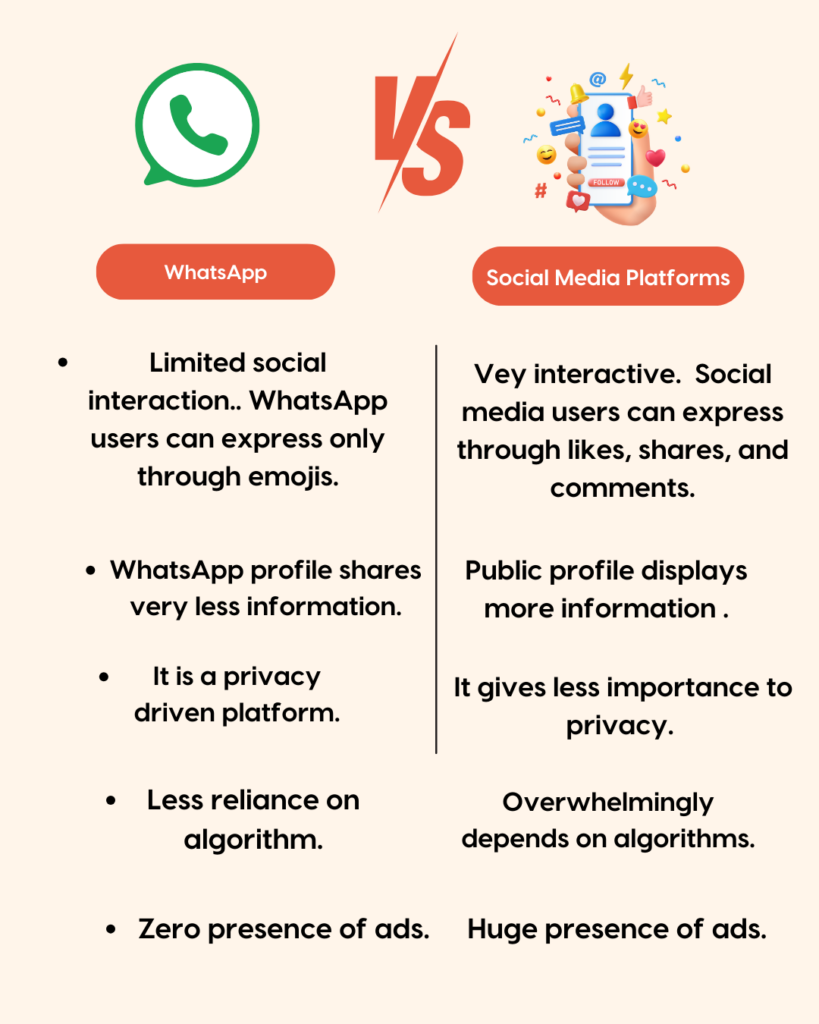Today WhatsApp is unarguably the most popular instant messaging app with nearly 3 billion active users across the world. However, probably no one will disagree that over the years WhatsApp has changed and evolved mainly by integrating several social media features. Today some of these social media features have become a part of the instant messaging app’s core feature and have, in fact, contributed immensely to its popularity. This has prompted many people to wonder whether WhatsApp is a social media platform or only an instant messaging app. While many people may still be hesitant about labeling WhatsApp as a social media platform, there is no doubt that it has trespassed quite deeply into the social media realm.
This latest blog post from PRchitects has tired to settle this debate for once and all.
What defines a social media platform?
The first major step in settling this debate is to look into what really defines a social media platform. Most certainly, almost all social media platforms like Facebook, Twitter, or Instagram have lot of common exclusive features. Let us breakdown these common exclusive features.
Social interaction and engagement: This is unarguably the most defining feature of social media platforms. Its users can easily connect and engage in different types of conversations. They can even form communities and groups for engaging in public discussion.
User generated content: Users enjoy the unparallel freedom of creating and sharing their content. In the social media world, these people are referred to as content creators.
Public profiles: Social media users mandatorily have a public profile that displays their basic information in the public domain. Even though today many social media platforms allow their users to lock their profiles for privacy concerns, public profiles remains one of the defining features of social media platforms.
Similarities between WhatsApp and Social Media Platforms
Now that we know the core characteristics of social media platforms, let us find out how WhatsApp fares when compared with social media platforms. We will first look into similarities and then follow it up by looking into differences.
Social interaction: Like most social media platforms, WhatsApp also allows social interactions.
User generated content: WhatsApp users can also share text messages, images and videos. Especially with the launch WhatsApp Channel in 2023, the instant messaging app has become one of the go-to platforms for user generated content.
Group formation: Many popularsocial mediaplatforms like Facebook allow users to form group based on their hobbies and interests. Talking specifically about WhatsApp, group chat is one of the defining features of the instant messaging app. Additionally, the platform has also introduced WhatsApp communities that brings multiple WhatsApp under one roof.
Real time communication: Just like most social media platforms, WhatsApp too supports real-time communication. This is exactly why it is called an instant messaging app.
Differences between WhatsApp and Social Media Platform

Limited social interaction: Despite the launch of WhatsApp Channel and WhatsApp Community that has surely increased the ambit of its social interaction, the platform is still not as interactive as most other social media platforms. For instance, WhatsApp users can express only through emojis whereas Facebook and Instagram users can express through likes, shares, and comments. Another limiting factor is that while most social media platforms allow even anonymous people or non-followers to view your public posts, WhatsApp’s post or status is visible to only to your contacts.
Public profiles: Public profiles on Facebook, Instagram and Twitter display more information like your personal details (name & location) interest, hobbies, and professional details. WhatsApp profile, on the other hand, shares very scarce and limited information.
Privacy driven platform: WhatsApp is essentially a privacy driven messaging platform. This pretty much explains the reason for its limited social interaction. Social media platforms. On the contrary, social media platforms comparatively give lesser importance to privacy, allowing users posts and content to be viewed by wider audience.
Less reliance on algorithm: Since WhatsApp is primarily a messaging platform, it does not depend on algorithms for curating content. However, this is not true about most social media platforms. For improving the user experience of their users, social media platforms overwhelmingly depend on algorithms to curate their content.
Zero presence of ads: Even though WhatsApp is owned by a social media company Meta, you will never see ads or sponsored posts on the platform. But the situation is exactly opposite on social media platforms where ads often have a great presence. Platforms like Facebooks, Twitter, and Instagram overwhelmingly depend on ads for their substance and revenue.
Conclusion:
The integration of social media features into WhatsApp should be seen as a part of its evolution and its desire to remain relevant in an increasingly competitive environment. At best, you can call it a hybrid platform that offers social media features as a value-added feature. At the heart of it, WhatsApp is and will always remain a messaging platform. It is highly unlikely that it will ever trade or compromise on its privacy features for expanding or consolidating its social media features. Therefore, it is apt to sat that WhatsApp exactly does not fit into the traditional mold of social media platforms.

